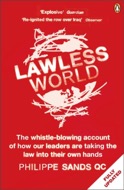
International law is a subject that, on the face of it, has little drawing power. Yet over the past couple of years, in the context of the legality of the Iraqi invasion, it has become central to the political debate in Britain. Similarly, the anti-globalisation movement has drawn attention to the ramifications of international law as it impinges upon the developing world. Philippe Sands's book has already commanded the headlines because of its revelations concerning the attorney general's statement in favour of the legality of the Iraqi war. It would be a mistake, though, if Lawless World were to be seen primarily in these terms: it is far more important than that. In exploring the evolution of international law since the second world war, and the new American attitude of withdrawal and unilateralism, it goes to the very heart of the nature of the international order and its future.
Although a large body of international law predates 1945, its real growth and influence has come in the period since. Its development was a conscious attempt by the west - notably the Americans and to some extent the British - to design an international order in their own image. Of course, until the end of the cold war, its writ was almost wholly confined to the western world, a fact strangely taken for granted by Sands; indeed it barely gets a mention.
By far the most important body of international law concerns trade and overseas investment. Sands shows how rules governing overseas investment began to take shape in the 1960s as a direct response to the emergence of the newly independent former colonies and a conscious attempt to shackle their political freedom. It is these laws - secretive, hidden from view and, above all, binding - that have underpinned the neoliberal globalisation project. The chapters on trade and investment reveal how biased these rules are in favour of the west, and how they are made and exercised in institutional recesses that are unaccountable, even to cabinets, let alone parliaments, and utterly invisible to the public eye. This is the nexus of corporate, bureaucratic and judicial power.
By and large, though, Sands is more optimistic about the value and prospects for international law. He discusses the Pinochet judgment, which placed human rights abuses by a president above the sanctity of the sovereign nation-state. In the same context, he gives a positive appraisal of the formation of the International Criminal Court. Similarly, he shows how legislation to protect the environment, especially in the sphere of climate change, most notably Kyoto, is fundamental to any serious effort to constrain or reverse global warming. He argues, moreover, that international law-making, even in the economic arena, is slowly being prised open and thereby subject to influence by a growing number of actors, including developing countries and NGOs. He recognises that international law is opaque and largely undemocratic, but believes, perhaps too optimistically, that the processes and institutions are being opened up,
The nub of the book, however, concerns the way in which the United States, since the Bush presidency, has decided to opt out of international treaties. The story is now well known. The US has turned its back on the International Criminal Court - and gone to great lengths to try to ensure that none of its own citizens will ever be brought before that court; it has renounced its obligations under the Kyoto Protocol; it has flagrantly violated all the established international codes of behaviour concerning prisoners of war (or, alternatively, criminal acts) at Guantánamo; it reneged on international law in the invasion of Iraq, along, of course, with the United Kingdom; and in Iraq and elsewhere, it has bypassed all the laws forbidding the use of torture, most notably at Abu Ghraib. Sands subjects American behaviour - above all, and perhaps most interestingly, the political and legal reasoning behind its new stance - to forensic examination.
In so doing he throws new light on the nature of the neo-conservative revolution and its determination to remake the world in America's interests. The prime author of the huge growth in international law since 1945 has, in effect, suddenly chosen to opt out and declare that this legislation is no longer binding on it.
It is a salutary reminder that what appeared in an earlier era (notably the 1990s) to be the remorseless logic of an increasingly globalised world - namely the emergence of new rules of global governance, together with a plethora of institutions to exercise them - far from being the product of some neutral "universal interest", was and is, on the contrary, a function of good old-fashioned political power. In one leap, the United States now stands outside what it helped to create. It no longer feels that its interests are served by being party to them. It no longer wants to be constrained by them.
Sands is right that, as some aspects of international law have become increasingly subject to the influence of other actors, the United States no longer feels comfortable with them and thus believes that they are no longer in its interests. But Sands also underestimates what might be described as the political dimension of the legal question. International law remains a function of power - the power of nation-states. And none is more powerful than the US.
The withdrawal of its support undermines - in one blow - the legitimacy of those treaties that America has absconded from. Of course, the United States will pay - nay, is already paying - a political price for this, namely its global unpopularity. But there is no guarantee that this will change America's mind. The path that the country is now embarked on may last rather longer than people outside the United States care to entertain: and, for certain, things will never be the same again. There will be no return to the days of "the west" as it existed when much of the corpus of international law was established. Moreover, looking further ahead, would a world dominated by the United States, China and India be more or less partial to living by global rules and international law? There are plenty of reasons for doubt. We might think it is a good thing - certainly Europe does - but that does not make it any more likely to happen.
This is an excellent book. It is also highly readable, which is a fine achievement, given the slightly forbidding subject matter. At times the book is engagingly personal. Sands describes the scene at the House of Lords appeal on Pinochet so well that one almost feels as if one is there. And he memorably recounts the process by which the climate-change conventions arrive at their decisions: far from being neat and legalistic, they are a cacophony of late nights, private deals, stamina and eccentric individuals who enjoy an influence well beyond expectation.
Sands writes not as a dull international lawyer but as an astute observer of human situations. Lawless World is also a model of clarity: one is never left gasping for comprehension. Above all, though, it is authoritative and ruthless in its analysis of the conduct of the United States and withering about the role of Britain. It is a book that deserves to be widely read.
Available at Timbooktoo tel: 4494345/5033448




